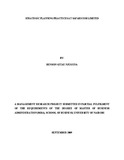| dc.description.abstract | There is no one clear way advocated by scholars on how institutions should go about in
conducting or practicing their strategic planning practices. Different authors and scholars have
advanced that strategies can form implicitly as well as be formulated explicitly (Mintzberg 1991,
Johnson and Scholes 1993). The importance of effective strategic planning practices is
recognized by most organizations. A majority of organizations understand the need to clearly
identify their mission and objectives, their priorities and targets for improvement, and the action
to be taken to achieve them. Good progress has been made over a long period to improve the
rigor of strategic planning. The objectives of this study were to determine the strategic planning
practices adopted by Safaricom Limited and to establish the challenges of strategy
implementation at Safaricom Limited.
This research was conducted through a case study. This is because it enabled the researcher to
have an in-depth understanding of the behavior pattern of the Safaricom Limited. Primary data
was collected from the heads of departments of the company, selected from various departments
such corporate strategy, human resources, regulatory, and business development, sales and marketing department using an interview guide. The data collected which was qualitative in
nature and therefore it was analyzed using content analysis.
The study found out that the strategic planning practices adopted by Safaricom Limited were on
financial factors; conducts mid-year review of Budget and Economic Forecast, it reviews
Financial Policy; compiles a list of unfunded/unproductive mandates for legislative review and
also it reviews Budget Process regularly for efficiency. On organizational structure, the
interviewees felt that the structure acts as a key determinant of what is appropriate. The structure
of the organization directly affects the processes and perspectives of the whole strategy planning
process. The study recommended that Safaricom should also employee more of proactive
strategies than reactive strategic planning. | en |

